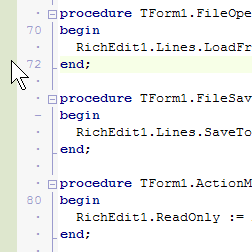Nouveautés de l'IDE depuis Delphi 7
IDE Features Since Delphi 7 | ||
| MSBuild Build Engine | The IDE now uses MSBuild as the IDE's build engine. This allows for build configurations, pre- and post-build events, and IDE builds that are the same as command-line builds. | |
| File Explorer | The IDE now has a File Explorer built into it that allows for access to files on the machines hard drive. Files can be added to projects or opened in the Code Editor. The File Browser can be docked into the IDE like any other dockable window. | |
| Live Templates | Live Templates speed-up typing by providing template-based code insertion. Live Templates are simple XML files, so developers can write their own code templates depending on their specific needs. Below is a picture of Live Templates in action, creating a try...finally block: | |
| Block Completion | Block Completion ensures that code blocks are properly closed. It will automatically close a block (usually with an'end;') when hitting return after opening a code block. | |
| History Tab | The History Tab functions as a very simple source control system. Each time a file is saved, a backup is made and stored in a subdirectory. The IDE tracks these follows and allows the developer to review earlier versions of the file using a diff engine. If an older version of the file is needed, it can replace the existing file. The screenshot below shows the history tab doing a diff on two previous versions of a file: | |
| Enhanced Debugging Features | New debugger features include:
| |
| VCL Guidelines | The VCL Designer now provides guidelines that make spacing and aligning controls a vastly easier task. When controls are properly aligned or spaced, the designer will display a visual guideline that helps "snap" the components into alignment. The graphic below shows the feature in action. | |
| Code Folding | The editor can "fold" individual sections of code so that the folded code is hidden from view. By default, functions and procedures are folded. Users can define their own sections of code to be folded using the {$REGION} pragma. | |
| SyncEdit | The SyncEdit feature lets developers simultaneously edit identical identifiers in code. As changes are made to the first identifier, the same change is performed automatically on the other identifiers. Code Writers can also tab to different jump points to navigate to specific identifiers in code. | |
| Searchable Tool Palette | The tool palette is now searchable and filterable. Users can quickly find a component by simply typing the name or part of the name of a component. The Tool Palette is also very configurable. Developers can easily create their own categories and drag-n-drop components from one category to another. | |
| Editor Line Numbers | The editor now provides line numbering. By default, every tenth line is numbered, as well as the line number for the current line. Users can also choose to turn off line numbering, or to have every line numbered. | |
| Line Change Indicators | The Gutter shows information about the status of the lines in the editor. Lines changed since the last save are marked with a yellow bar. Lines changed since the file was first opened and before the last save are marked with green. | |
| Refactoring | Refactoring is a technique used to restructure and modify existing code in such a way that the intended behavior of the code stays the same. Refactoring allows developers to stream-line, simplify, and improve both performance and readability of application code. Delphi 2007 for Win32 provides the following refactoring operations:
| |
| Integrated Unit Testing | Delphi 2007 for Win32 ships with built-in support for DUnit. This framework simplifies the process of building tests for classes and methods in application. Using unit testing in combination with refactoring can improve application stability. Testing a standard set of tests every time a small change is made throughout the code makes it more likely that errors will be caught early in the development cycle. The IDE provides wizards that allow developers to quickly and easily create unit tests for existing code libraries. | |
| Class and UML Modeling | Developers can do full UML and Class Modeling with Delphi, including two-way class modeling. | |













Aucun commentaire:
Enregistrer un commentaire